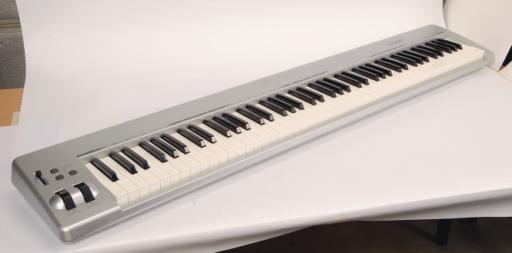MusicRadar Verdict
A full-size keyboard at a price that's right. Budget pianists take note.
Pros
- +
Responsive keys. Budget without too much compromise. Great companion to grand piano.
Cons
- -
Flimsy wheels and sliders. A bit plasticky.
MusicRadar's got your back

At 10kg, the Keystation is still a sturdy machine.

The 88es boasts some pretty conducive keys.
Although M-Audio already has most keyboard controller bases covered, the Keystation 88es brings something different to the party.
While 88-note keyboards of this nature have been around for a while, this is certainly the cheapest one around. First thoughts are that M-Audio must have cut more corners to keep the price down.
There's no disguising the fact that the 88es is made of plastic - it would probably crack if dropped - but at 10kg, it's sturdy enough. The installation procedure is non-existent for Windows XP or Mac OS X. Just plug the 88es in via the supplied USB cable and play away.
Power is provided by the same interface, though a DC adapter can also be used (sold separately). Other connections include a standard MIDI Output, sustain and volume pedal sockets -- all of these are located on the back of the unit.
Things don't get much more complicated on the Keystation's top surface. To the left of the keys are the slightly flimsy pitchbend and mod wheels; above these is a volume slider.
Unfortunately, this betrays the 88es' low price tag: it feels as if it could come off in your hand. Next to this are octave up/ down buttons (plus two blue LEDs that let you know whether they're in use) and an Advanced Functions button. You press this when you want to enter Edit mode: once in this configuration, you use the keys to select functions and enter data.
The semi-weighted, velocity-sensitive keys feel pretty good under your hands, and while pianists will be disappointed to learn they're not hammer-action, they have no right to expect such functionality at this price.
Want all the hottest music and gear news, reviews, deals, features and more, direct to your inbox? Sign up here.
Although they can feel a little stiff, the keys are conducive to some reasonably expressive playing, and are streets ahead of what you'll be used to if your existing controller is of the budget 49-note variety.
The 88es is an excellent companion to the grand pianos in Synthogy's Ivory - anyone who's bought a half-decent piano ROMpler should take a very close look at this controller.
M-Audio has filled a potentially lucrative niche with this one. The lack of hammer-action keys will put some people off, but if you want these, you'll have to fork out more. And although other potential customers will miss knobs and faders, such folk are well catered for already - this is a keyboard that's been designed with the budget conscious 'player' in mind. As such, it fulfils its remit very well.
Future Music is the number one magazine for today's producers. Packed with technique and technology we'll help you make great new music. All-access artist interviews, in-depth gear reviews, essential production tutorials and much more. Every marvellous monthly edition features reliable reviews of the latest and greatest hardware and software technology and techniques, unparalleled advice, in-depth interviews, sensational free samples and so much more to improve the experience and outcome of your music-making.
